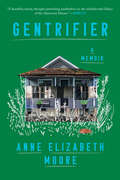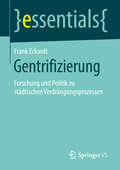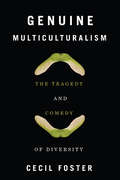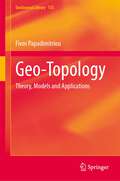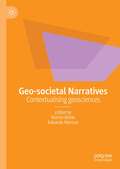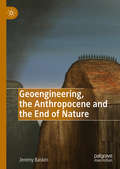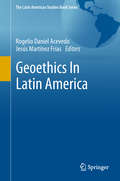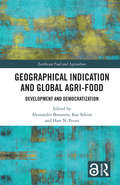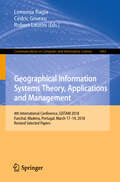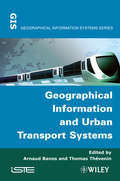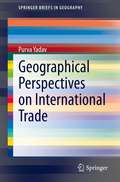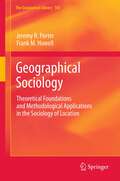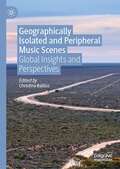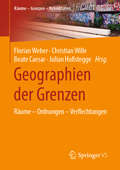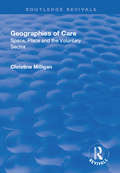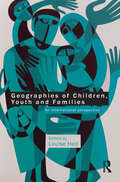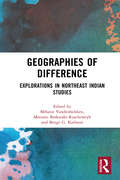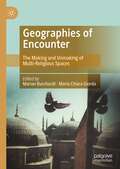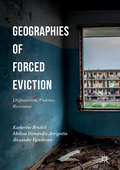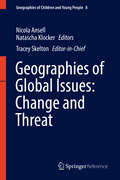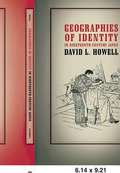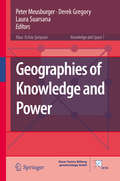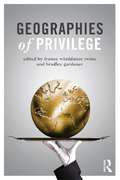- Table View
- List View
Gentrifier
by Peter Marcuse Marc Lamont Hill Jason Patch John Joe SchlichtmanAs urban job prospects change to reflect a more ‘creative’ economy and the desire for a particular form of ‘urban living’ continues to grow, so too does the migration of young people to cities. Gentrification and gentrifiers are often understood as ‘dirty’ words, ideas discussed at a veiled distance.Gentrifiers, in particular, are usually a ‘they.’ Gentrifier demystifies the idea of gentrification by opening a conversation that links the theoretical and the grassroots, spanning the literature of urban sociology, geography, planning, policy, and more. Along with established research, new analytical tools, and contemporary anecdotes, John Joe Schlichtman, Jason Patch, and Marc Lamont Hill place their personal experiences as urbanists, academics, parents, and spouses at the centre of analysis. They expose raw conversations usually reserved for the privacy of people’s intimate social networks in order to complicate our understanding of the individual decisions behind urban living and the displacement of low-income residents. The authors’ accounts of living in New York City, San Diego, Chicago, Philadelphia, and Providence link economic, political, and sociocultural factors to challenge the readers’ current understanding of gentrification and their own roles within their neighbourhoods. A foreword by Peter Marcuse opens the volume.
Gentrifier: A Memoir
by Anne Elizabeth MooreTaking on the thorny ethics of owning and selling property as a white woman in a majority Black city and a majority Bangladeshi neighborhood with both intelligence and humor, this memoir brings a new perspective to a Detroit that finds itself perpetually on the brink of revitalization.In 2016, a Detroit arts organization grants writer and artist Anne Elizabeth Moore a free house—a room of her own, à la Virginia Woolf—in Detroit&’s majority-Bangladeshi &“Banglatown.&” Accompanied by her cats, Moore moves to the bungalow in her new city where she gardens, befriends the neighborhood youth, and grows to intimately understand civic collapse and community solidarity. When the troubled history of her prize house comes to light, Moore finds her life destabilized by the aftershocks of the housing crisis and governmental corruption. This is also a memoir of art, gender, work, and survival. Moore writes into the gaps of Woolf&’s declaration that &“a woman must have money and a room of one&’s own if she is to write&”; what if this woman were queer and living with chronic illness, as Moore is, or a South Asian immigrant, like Moore&’s neighbors? And what if her primary coping mechanism was jokes? Part investigation, part comedy of a vexing city, and part love letter to girlhood, Gentrifier examines capitalism, property ownership, and whiteness, asking if we can ever really win when violence and profit are inextricably linked with victory.
Gentrifizierung: Forschung Und Politik Zu Städtischen Verdrängungsprozessen (Essentials)
by Frank EckardtDieses essential stellt in komprimierter Form den Stand der Stadtforschung zum Thema Gentrifizierung dar. Dieser in der Wissenschaft bereits seit den 1960iger-Jahren verwendete Begriff hat sich inzwischen auch in der öffentlichen Debatte eingebürgert. Er beschreibt, wie steigende Mieten in den Städten und der Mangel an bezahlbaren Wohnraum dazu führen, dass ärmere Bewohnerinnen und -bewohner aus ihren Vierteln verdrängt werden. Dabei wird deutlich, in welcher Weise es sich bei der Gentrifizierung um ein allgemeines Prinzip von Stadtentwicklung handelt und damit eine erhebliche Herausforderung der sozialen Mischung unserer Städte einhergeht. Es wird auch dargestellt, welche politischen Maßnahmen aus Sicht der Forschung ergriffen werden müssten, um Verdrängungen zu verhindern.
Genuine Multiculturalism
by Cecil FosterWhile many modern societies are noted for their diversity, the resulting challenge is to determine how citizens from different backgrounds and cultures can see themselves and each other as equals, and be treated equally. In Genuine Multiculturalism, Cecil Foster shows that a society's failure to bridge these differences is the tragedy of modern living and that pretending it is possible to mechanically develop fraternity and solidarity among diverse groups is akin to seeking out comedy. Arguing that genuine multiculturalism is the search for social justice by individuals who have been trapped by ascribed identities or newcomers who have been shut out of perceived ethnic homelands, Foster details how this process, in essence, is the story of the Americas. Reconceptionalizing the terms of multiculturalism, he offers an intervention into Canada's claim that its definition and practice are based on recognizing equality of citizenship. Identifying genuine multiculturalism as an ongoing work in progress, rather than a tightly defined policy position, Foster challenges readers to imagine a greater and more harmonious ideal. A necessary theoretical reconsideration of diversity within society, Genuine Multiculturalism refocuses the debate about ideals and practices in modern societies.
Genuine Multiculturalism: The Tragedy and Comedy of Diversity
by Cecil FosterWhile many modern societies are noted for their diversity, the resulting challenge is to determine how citizens from different backgrounds and cultures can see themselves and each other as equals, and be treated equally. In Genuine Multiculturalism, Cecil Foster shows that a society's failure to bridge these differences is the tragedy of modern living and that pretending it is possible to mechanically develop fraternity and solidarity among diverse groups is akin to seeking out comedy. Arguing that genuine multiculturalism is the search for social justice by individuals who have been trapped by ascribed identities or newcomers who have been shut out of perceived ethnic homelands, Foster details how this process, in essence, is the story of the Americas. Reconceptionalizing the terms of multiculturalism, he offers an intervention into Canada's claim that its definition and practice are based on recognizing equality of citizenship. Identifying genuine multiculturalism as an ongoing work in progress, rather than a tightly defined policy position, Foster challenges readers to imagine a greater and more harmonious ideal. A necessary theoretical reconsideration of diversity within society, Genuine Multiculturalism refocuses the debate about ideals and practices in modern societies.
Geo-Topology: Theory, Models and Applications (GeoJournal Library #133)
by Fivos PapadimitrouGeo-Topology is an exploration of the depth and breadth of the relationships between Geography and Topology, with applications ranging from Landscape Geography to Social Geography and from Spatial Analysis to Geospatial Technologies. It shows how topics of geographical research (landscapes, borders, spatial social relationships etc) can be examined by using mathematical concepts and methods of Topology, exposing the realm of geo-topological modelling and visualization through Point-Set Topology, Knot Theory, Reeb graphs, Topological Surfaces (i.e. Möbius bands and Klein bottles), Differential Topology, Network Analysis, Combinatorial Topology, Braid Theory and Ultrametric Topology. Besides geographers, this book is a trove of new ideas for landscape ecologists, mathematicians, data scientists, sociologists, psychologists, anthropologists and educators. Geo-Topology is a systematic introduction to topological thinking in Geography, also by highlighting the significance of Topology for Geographical Education, as well as for the Philosophy and Epistemology of Geography.
Geo-societal Narratives: Contextualising geosciences
by Martin Bohle Eduardo MaroneThis book provides an accessible overview of the societal relevance of contemporary geosciences. Engaging various disciplines from humanities and social sciences, the book offers philosophical, cultural, economic, and geoscientific insights into how to contextualise geosciences in the node of Culture and Nature.The authors introduce two perspectives of societal geosciences, both informed by the lens of geoethics. Throughout the text core themes are explored; human agency, the integrity of place, geo-centricity, economy and climate justice, subjective sense-making and spirituality, nationalism, participatory empowerment and leadership in times of anthropogenic global change. The book concludes with a discussion on culture, education, or philosophy of science as aggregating concepts of seemingly disjunct narratives.The diverse intellectual homes of the authors offer a rich resource in terms of how they perceive human agency within the Earth system. Two geoscientific perspectives and fourteen narratives from various cultural, social and political viewpoints contextualise geosciences in the World(s) of the Anthropocene.
Geoengineering, the Anthropocene and the End of Nature
by Jeremy BaskinThis book takes a critical look at solar geoengineering as an acceptable means for addressing climate change. Baskin explores the assumptions and imaginaries which animate ‘engineering the climate’ and discusses why this climate solution is so controversial. The book explains geoengineering’s past, its revival in the mid-2000s, and its future prospects including its shadow presence in the Paris climate accord. The main focus however is on dissecting solar geoengineering today – its rationales, underpinning knowledge, relationship to power, and the stance towards nature which accompanies it. Baskin explores three competing imaginaries associated with geoengineering: an Imperial imaginary, an oppositional Un-Natural imaginary, and a conspiratorial Chemtrail imaginary. He seeks to explain why solar geoengineering has struggled to gain approval and why resistance to it persists, despite the support of several powerful actors. He provocatively suggests that reconceptualising our present as the Anthropocene might unwittingly facilitate the normalisation of geoengineering by providing a sustaining socio-technical imaginary. This book is essential reading for those interested in climate policy, political ecology, and science & technology studies.
Geoethics In Latin America (The Latin American Studies Book Series)
by Rogelio Daniel Acevedo Jesús Martínez FríasThis book studies geoethics in Latin America and offers comprehensive research on geoethics and geoeducation. Its respective chapters explore geoethics in relation to UNESCO geoparks, mining activities in Latin America, natural hazards and risk management. Geoethics is a key discipline in the field of Earth and Planetary Sciences, and not only includes scientific, technological, methodological and social-cultural aspects, but also addresses the need to consider appropriate protocols, scientific integrity issues and a code of good practice when studying the abiotic world.The position of Latin America’s recently created geoethics associations is based on protection of the environment, together with a reassurance that the balance of nature and the rights of human beings to enjoy it will be preserved.
Geographical Indication and Global Agri-Food: Development and Democratization (Earthscan Food and Agriculture)
by Alessandro Bonanno; Kae Sekine; Hart N. FeuerThis book addresses the relevance of geographical indication (GI) as a tool for local and socio-economic development and democratization of agri-food, with case studies from Asia, Europe and the Americas. A geographical indication is a sign used on products that have a specific geographical origin and possess qualities or a reputation that are due to that origin. It provides not only a way for businesses to leverage the value of their geographically unique products, but also to inform and attract consumers. A highly contested topic, GI is praised as a tool for the revitalization of agricultural communities, while also criticized for being an instrument exploited by global corporate forces to promote their interests. There are concerns that the promotion of GI may hamper the establishment of democratic forms of development. The contributing authors address this topic by offering theoretically informed investigations of GI from around the world. The book includes case studies ranging from green tea in Japan, olive oil in Turkey and dried fish in Norway, to French wine and Mexican Mezcal. It also places GI in the broader context of the evolution and trends of agri-food under neoliberal globalization. The book will be of interest to researchers, policy makers and students in agri-food studies, sociology of food and agriculture, geography, agricultural and rural economics, environmental and intellectual property law, and social development.
Geographical Information Systems Theory, Applications and Management: 4th International Conference, GISTAM 2018, Funchal, Madeira, Portugal, March 17–19, 2018, Revised Selected Papers (Communications in Computer and Information Science #1061)
by Cédric Grueau Robert Laurini Lemonia RagiaThis book constitutes the thoroughly refereed proceedings of the 4th International Conference on Geographical Information Systems Theory, Applications and Management, GISTAM 2018, held in Funchal, Madeira, Portugal, in March 2018.The 7 revised full papers presented were carefully reviewed and selected from 58 submissions. The papers are centered on urban and regional planning; water information systems; geospatial information and technologies; spatio-temporal database management; decision support systems; energy information systems; GPS and location detection.
Geographical Information and Urban Transport Systems
by Arnaud Banos Thomas ThéveninUrban transport systems need to be analyzed from various perspectives: the offer on one hand, the demand on the other hand, but also their negative externalities (risks of transport systems). These three dimensions are rarely apprehended in an integrated perspective. This book provides a large collection of chapters dealing with these specific dimensions, each written by recognized specialists in their domain, and articulates them in an integrated way.
Geographical Perspectives on International Trade (SpringerBriefs in Geography)
by Purva YadavThis book analyzes spatial and temporal patterns of international trade from a geographical perspective. Trade is an important key to understanding the changing dynamics of economic spaces over time. However, studies by geographers are largely confined to case studies, whereas the spatial dimension is often missing from the approach of economists. This study highlights spatial patterns and commodity composition of global trade and the nature of relationship between trade and other economic attributes. A case study of the MERCOSUR trade block examines inter-regional and intra-regional trade flows. The book captures a comprehensive picture of the structure of international exchange by using ample maps and illustrations as supporting features. Many different methods are applied such as the location quotient to capture concentration and diversification of commodity composition, data reduction techniques such as factor analysis and regression models for relating the economic structures and trade patterns as well as residual mapping among others. This book is a significant contribution to geographical, economical and social sciences research and very useful to graduate and post-graduate students as well as scientists of all related areas who have interest in exploring the changing dynamics of the global economy via trade flows. It provides a road map to further explore different dimensions of international trade and its role in understanding the transforming global economy.
Geographical Sociology: Theoretical Foundations and Methodological Applications in the Sociology of Location
by Frank M. Howell Jeremy R. PorterThe discipline of Sociology has a rich history of including spatial context in the analysis of social issues. Much of this history has revolved around the development and application of spatial theory aimed at understanding the geographic distribution of social problems, the organization of communities, and the relationship between society and the environment. More recently, the social sciences have seen a large number of technological innovations that now make it possible to place social behaviour in spatial context. Consequently, because of the historical disjuncture in the development of spatial theory and the recent development of relevant methodological tools, the relationship between materials describing both the methodological approaches and their theoretical importance a scattered throughout various books and articles. Geographical Sociology consolidates these materials into a single accessible source in which spatial concepts such as containment, proximity, adjacency, and others are examined in relation to such methodological tools as hierarchical linear models, point pattern analysis, and spatial regression. As these methods continue to increase in popularity among social scientists the ability to more generally understand societies relationship to geographic space will continue to increase in it importance in the field. This book represents a starting point to linking these concepts to practice and is presented in an accessible form in which students, researchers, and educators can all learn, and in turn, contribute to its development.
Geographically Isolated and Peripheral Music Scenes: Global Insights and Perspectives
by Christina BallicoThis book explores the influence of geographical isolation and peripherality on the functioning of music industries and scenes which operate within and from such locales. As is explored, these sites engage dynamic practices to offset challenges resulting from geographical isolation and peripherality.
Geographien der Grenzen: Räume – Ordnungen – Verflechtungen (Räume – Grenzen – Hybriditäten)
by Florian Weber Christian Wille Beate Caesar Julian HollsteggeDer Sammelband diskutiert den Zusammenhang von Räumen, Ordnungen und Verflechtungen. Die Autor*innen aus den Raum-, Sozial- und Kulturwissenschaften wählen unterschiedliche Zugänge zu Grenzen und analysieren ihre (Re-)Produktionsprozesse als ‚Geographien der Grenzen‘. Dabei rücken sie auch andere als nationalstaatliche Grenzen in den Blick, wie zum Beispiel stadtlandhybride Differenzierungen. So wird in diesem Band aus verschiedenen theoretischen und thematischen Blickwinkeln der Frage nachgegangen, wie und welche ,Geographien der Grenzen‘ sich im Zusammenspiel von unterschiedlichen Destabilisierungen und (Re-)Stabilisierungen von Grenzen (re)konstruieren lassen.
Geographies of Care: Space, Place and the Voluntary Sector (Routledge Revivals)
by Christine MilliganThis title was first published in 2001. As care services in Britain have moved from institutional to community-based environments, there has been a simultaneous shift in those agencies concerned with the provision of such care and support. this new environment of care is a complex one, involving numerous different actors and agencies that operate across various different spatial and organizational levels of the policy process. The implementation and success of care policies depend in part on the inter-relationships between these various players. This book examines these inter-relationships, illustrated by an in-depth empirical study of policy makers and informal care providers concerned with the frail elderly in Scotland. Taking the voluntary sector as a lens through which these inter-relationships are explored, it analyzes how voluntary support is affected by differing local contexts of care and what this means in terms of locally based care outcomes.
Geographies of Children, Youth and Families: An International Perspective
by Louise HoltThis edited collection brings together international experts from the vibrant and growing field of geographies of children, youth and families. Designed as an introduction to the topic, this book provides an overview of current conceptual and theoretical debates surrounding geographies of children, youth and families, and gives a wide range of examples of cutting-edge research from a variety of national contexts across the globe. The theme of ‘disentangling the socio-spatial contexts of young people and/or their families’ advances debates in the field by emphasising the context of young people’s social agency. Geographies of Children, Youth and Families is an invaluable course text for undergraduate and postgraduate students of geography and the social sciences, as well as being of interest to students and practitioners of education, youth work, social policy, and social work.
Geographies of Difference: Explorations in Northeast Indian Studies
by Mélanie Vandenhelsken Meenaxi Barkataki-Ruscheweyh Bengt G. KarlssonThis book rethinks Northeast India as a lived space, a centre of interconnections and unfolding histories, instead of an isolated periphery. Questioning dominant tropes and assumptions around the Northeast, it examines socio-political and historical processes, border issues, the role of the state, displacement and development, debates over natural resources, violence, notions of body and belonging, movements, tensions and relations, and strategies, struggles and narratives that frame discussions on the region. Drawing on current and emerging research in Northeast India studies, this work will be of great interest to scholars and researchers of politics, human geography, sociology and social anthropology, history, cultural studies, media studies and South Asian studies.
Geographies of Encounter: The Making and Unmaking of Multi-Religious Spaces
by Marian Burchardt Maria Chiara GiordaThis edited collection explores forms of multi-religious cohabitation as well as the spatial arrangements that underpin and shape them through sixteen chapters that range across disciplines, historical periods, and global geographies. Focusing on interactions between different religious groups and traditions, the authors conceptualize three types of spatial arrangements and explore how they operate ad geographies of encounter; i.e., multi-religious places, multi-religious cities, and multi-religious landscapes. With perspectives from anthropologists, historians, sociologists, and geographers, the book demonstrates the multiple ways in which geographies of interreligious encounters and forms of multi-religious cohabitation have changed throughout history due to their embeddedness id different frameworks of political organization, shifting religious ideologies, and changing forms of human mobility.
Geographies of Forced Eviction: Dispossession, Violence, Resistance
by Melissa Fernández Arrigoitia Katherine Brickell Alexander VasudevanThis book offers a close look at forced evictions, drawing on empirical studies and conceptual frameworks from both the Global North and South. It draws attention to arenas where multiple logics of urban dispossession, violence and insecurity are manifest, and where wider socio-economic, political and legal struggles converge. The authors highlight the need to apply emotional and affective registers of dispossession and insecurity to the socio-political and financial economies driving forced evictions across geographic scales. The chapters each consider the distinct urban logics of precarious housing or involuntary displacements that stretch across London, Barcelona, Rio de Janeiro, Shanghai and Colombo. A timely addition to existing literature on urban studies, this collection will be of great interest to policy makers and scholars of human geography, development studies, and sociology.
Geographies of Global Issues: Change and Threat
by Tracey Skelton Nicola Ansell Natascha KlockerVolume 8 explores children and young people’s lives at a time of rapid and profound change, through the lens of diverse global processes: economic globalisation, environmental degradation, international development, cultural change, climate change and environmental hazards. Today’s children and young people are growing up in a world that is rapidly changing and very different to that experienced by previous generations. Contemporary social, economic and environmental challenges make children and young people vulnerable and expose them to harm. Equally, they compel them to become instigators of change across geographical scales, from the household to the globe. Children and young people need to be adaptive and resourceful: economically, socially and emotionally. This volume is divided into two substantive sections. Chapters in the first section explore global economic changes and instabilities that are altering patterns of work, compelling children to take on new economic responsibilities and reshaping childcare arrangements. Several chapters address the ways in which global processes shape young people’s subjectivities, with media, internet and education encouraging children and youth to view themselves as both entrepreneurs and global citizens. Other chapters consider the policies and development interventions implemented by global organisations and national governments. These can have unintended consequences because they are rooted in a normative discourse of a ‘global child’ that bears little relation to lived realities. Chapters in the second section foreground children and young people’s contributions to environmental issues and debates. Children and young people are affected by environmental change: by pollution, environmental hazards and climate change. They suffer displacement, ill-health and anxiety about the future. They are also intimately attached to – and knowledgeable about – their local environments. Children and young people actively shape their environments, yet their lives remain powerfully influenced by today’s decision-makers. The window of opportunity to avoid catastrophic climate change is small. Evidence of children and young people’s environmental knowledge and activism does not obviate the need for adults to take decisive action, now, to ensure a viable environment for future generations.
Geographies of Identity in Nineteenth-Century Japan
by David L. HowellDavid L. Howell looks beneath the surface structures of the Japanese state to reveal the mechanism by which markers of polity, status, and civilization came together over the divide of the Meiji Restoration of 1868. The author exposes the many levels of anxiety inherent in the Meiji state's redefinition of status.
Geographies of Knowledge and Power
by Derek Gregory Peter Meusburger Laura SuarsanaInterest in relations between knowledge, power, and space has a long tradition in a range of disciplines, but it was reinvigorated in the last two decades through critical engagement with Foucault and Gramsci. This volume focuses on relations between knowledge and power. It shows why space is fundamental in any exercise of power and explains which roles various types of knowledge play in the acquisition, support, and legitimization of power. Topics include the control and manipulation of knowledge through centers of power in historical contexts, the geopolitics of knowledge about world politics, media control in twentieth century, cartography in modern war, the power of words, the changing face of Islamic authority, and the role of Millennialism in the United States. This book offers insights from disciplines such as geography, anthropology, scientific theology, Assyriology, and communication science.
Geographies of Privilege
by France Winddance Twine Bradley GardenerHow are social inequalities experienced, reproduced and challenged in local, global and transnational spaces? What role does the control of space play in distribution of crucial resources and forms of capital (housing, education, pleasure, leisure, social relationships)? The case studies in Geographies of Privilege demonstrate how power operates and is activated within local, national, and global networks. Twine and Gardener have put together a collection that analyzes how the centrality of spaces (domestic, institutional, leisure, educational) are central to the production, maintenance and transformation of inequalities. The collected readings show how power--in the form of economic, social, symbolic, and cultural capital--is employed and experienced. The volume’s contributors take the reader to diverse sites, including brothels, blues clubs, dance clubs, elite schools, detention centers, advocacy organizations, and public sidewalks in Canada, Italy, Spain, United Arab Emirates, Mozambique, South Africa, and the United States. Geographies of Privilege is the perfect teaching tool for courses on social problems, race, class and gender in Geography, Sociology and Anthropology.

